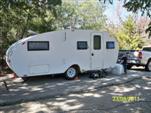 by jimqpublic » Mon Nov 14, 2005 1:17 pm
by jimqpublic » Mon Nov 14, 2005 1:17 pm
I really wish I had the old post from my charge system design. What stops good battery charging in the trailer is having too little voltage differential between the battery and the supplied charge voltage- at the battery not at the alternator.
Yes, you can parallel conductors to improve your charge rate by lowering resistance. You won't get 30 amps of charge from #10 wire though. It all depends on your tow vehicle's voltage regulator, system resistance, tow vehicle battery state of charge and trailer battery state of charge.
Personally if I were paralleling wires I would protect each independantly with an appropriately sized self-resetting circuit breaker.
More random notes:
I have a continuous duty starter relay (rated at 65 amps continuous) switched by an accessory circuit in the car and a self-resetting breaker. I used 6AWG Anchor brand marine grade stranded cable with soldered lugs and adhesive lined heat shrink for the charge line in the car. On the trailer end I used 4AWG battery cable from the end of the trailer cord (which is 10AWG) to the batteries, which are at the very rear of the trailer.
After looking at all the appropriate cable options- Marine cable is the most expensive, battery cable is next, and welding cable is cheapest. For 4AWG the marine grade is $2.25/foot, battery cable is $0.99, and welding cable doesn't come that small but 2AWG is just over $1/foot.
With my car I get great charging. The total cable length is quite long - believe it or not the total wire run is almost 50' even though the car+ trailer is only 33' long. I have two big golf cart batteries in the trailer and a small starting battery for the car. My alternator keeps pumping out 14.4-14.5 volts to keep the batteries charged. In a system with higher resistance and a bigger vehicle battery/smaller trailer battery what happens is once the vehicle battery is fully charged the voltage regulator cuts back the voltage to prevent overcharging. Then with voltage output down around 13.4 the trailer battery accepts very little charge.
What pushes the charge rate is the differential between battery voltage and charge voltage at the battery. If the battery is 50% discharged its voltage will be around 12.3. If the alternator is putting out 13.4, and there's a bit of resistance in the system, the charging voltage at the trailer battery might only be 13. So there's only 0.7 volts of differential to "suck" power into the battery.
On the other hand my system has lower resistance. With my alternator putting out 14.5 volts there's 2.2 volts of differential. The trailer batteries suck a lot of juice with this much differential. As amperage goes up there does start to be some voltage drop due to the system resistance but not until there's a pretty high charge rate.
I'm probably messing up the real science here but it seems to work.
By the way, two winters ago we camped four nights up in the snow at Sequoia National Park with our furnace burning through 20 pounds of propane. That means the blower was on for 21 hours using 73 amp-hours. Plus lights- probably another 27 amp hours for 100 total.
We hitched up and drove to Yosemite National Park. Probably about a 5 hour drive. According to my voltmeter the batteries were basically fully recharged at 12.7 volts.









